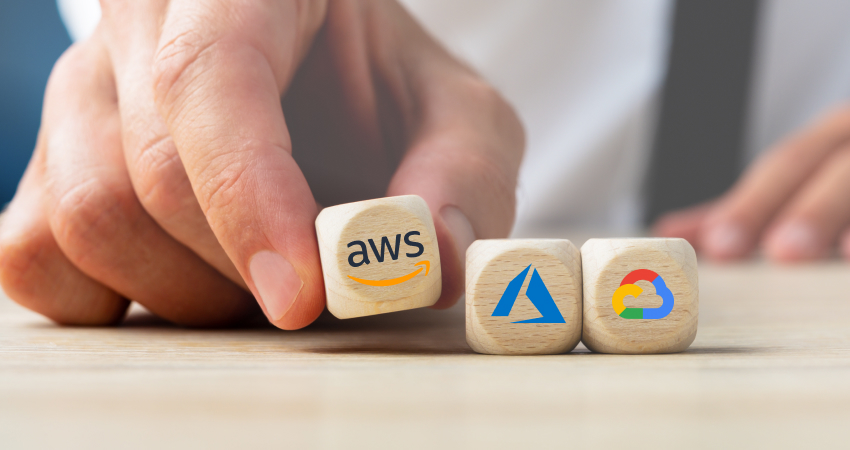Introduction:
Cloud computing has revolutionized the way businesses operate by providing scalable and cost-effective solutions. Amazon Web Services (AWS), Microsoft Azure, and Google Cloud Platform (GCP) are the leading players in the cloud computing market. While all three offer a wide range of services, each platform has its unique features, strengths, and target audiences. In this article, we will delve into the differences between AWS, Azure, and GCP, helping you understand their key characteristics, offerings, and use cases. By the end, you’ll have a better grasp of which cloud platform might be the best fit for your specific business needs.
Overview of AWS, Azure, and GCP:
Amazon Web Services (AWS):
AWS, launched in 2006, is the oldest and most mature cloud platform. It offers a vast array of services, including computing power, storage, databases, networking, and machine learning. AWS has a global presence with a wide range of region and availability zone options.
Microsoft Azure:
Azure, introduced in 2010, is Microsoft’s cloud computing platform. It provides services for computing, storage, networking, databases, AI, and more. Azure is known for its seamless integration with Microsoft products and services, making it popular among businesses heavily reliant on Microsoft technologies.
Google Cloud Platform (GCP):
GCP, launched in 2011, is Google’s cloud computing offering. It provides services for computing, storage, networking, databases, AI, and analytics. GCP is recognized for its strong focus on data analytics and machine learning capabilities, leveraging Google’s expertise in these areas.
Service Offerings and Capabilities
Compute Services:
- AWS: Elastic Compute Cloud (EC2) offers scalable virtual servers, providing a wide range of instance types for different workloads. It also offers auto-scaling and load balancing capabilities.
- Azure: Azure Virtual Machines (VMs) provide scalable compute resources, similar to EC2. Azure also offers Azure Functions for serverless computing and Azure Batch for high-performance computing.
- GCP: Google Compute Engine (GCE) delivers virtual machines with flexible configurations. GCP also provides serverless computing through Cloud Functions and supports high-performance computing workloads with Preemptible VMs.
Storage Services:
- AWS: Amazon Simple Storage Service (S3) is an object storage service with high durability and availability. AWS also offers Elastic Block Store (EBS) for persistent block storage and Glacier for long-term archival storage.
- Azure: Azure Blob Storage is an object storage service, offering different tiers for optimized performance and cost-efficiency. Azure also provides Azure Files for fully managed file shares and Azure Disk Storage for persistent block storage.
- GCP: Google Cloud Storage offers scalable and durable object storage with multi-regional, regional, and cold storage options. GCP also provides persistent disks for block storage and Cloud Filestore for fully managed file storage.
Networking and Content Delivery:
- AWS: Amazon Virtual Private Cloud (VPC) allows you to create isolated networks with customizable IP ranges. AWS also offers Amazon CloudFront for content delivery and AWS Direct Connect for dedicated network connections.
- Azure: Azure Virtual Network enables you to create private networks, and Azure Content Delivery Network (CDN) provides global content delivery. Azure ExpressRoute allows dedicated network connections.
- GCP: Google Virtual Private Cloud (VPC) provides networking capabilities, and Google Cloud CDN offers content delivery. GCP also supports Dedicated Interconnect for dedicated network connections.
Databases:
- AWS: Amazon Relational Database Service (RDS) offers managed relational databases such as MySQL, PostgreSQL, and SQL Server. AWS also provides Amazon DynamoDB, a NoSQL database service, and Amazon Redshift for data warehousing.
- Azure: Azure SQL Database provides a fully managed relational database service, and Azure Cosmos DB offers NoSQL database capabilities. Azure also offers Azure Database for MySQL, PostgreSQL, and MariaDB.
- GCP: Google Cloud Spanner is a horizontally scalable relational database service. GCP also provides Cloud Firestore for NoSQL databases and BigQuery for data warehousing and analytics.
Artificial Intelligence and Machine Learning:
- AWS: AWS offers a comprehensive set of AI and ML services, including Amazon SageMaker for building, training, and deploying ML models. AWS also provides services like Amazon Rekognition for image analysis and Amazon Polly for text-to-speech.
- Azure: Azure Machine Learning allows developers to build and deploy ML models, and Azure Cognitive Services offer various pre-built AI capabilities. Azure also provides services like Azure Speech to Text and Azure Computer Vision.
- GCP: GCP’s AI and ML offerings include Google Cloud AI Platform for ML model development and deployment. GCP also provides services like Google Cloud Vision for image analysis and Google Cloud Translation for language translation.
Target Audience and Use Cases:
AWS:
AWS caters to a broad range of customers, including startups, enterprises, and government organizations. Its extensive service portfolio makes it suitable for businesses with diverse requirements. Use cases include e-commerce, media streaming, gaming, and data-intensive applications.
Azure:
Azure is well-suited for businesses with existing Microsoft infrastructure and those looking for seamless integration with Microsoft products and services. It serves a wide range of industries, including finance, healthcare, and retail. Use cases include hybrid cloud deployments, Windows-based applications, and Office 365 integration.
GCP:
GCP appeals to organizations focused on data analytics, machine learning, and leveraging Google’s expertise in these areas. It is popular among startups and businesses in industries such as retail, finance, and marketing. Use cases include big data processing, AI-driven applications, and real-time analytics.
Pricing and Cost Considerations
- AWS: AWS offers a pay-as-you-go model with various pricing options, including on-demand, reserved instances, and spot instances. It provides a comprehensive pricing calculator to estimate costs accurately.
- Azure: Azure also follows a pay-as-you-go pricing model, with options for reserved instances and spot instances. Azure provides a pricing calculator and cost management tools to monitor and optimize costs.
- GCP: GCP offers competitive pricing, following a pay-as-you-go model. It provides sustained use discounts and committed use contracts for cost optimization. G
Conclusion:
Choosing the right cloud platform for your business requires careful consideration of your specific needs, technical requirements, and budget. AWS, Azure, and GCP are all industry-leading cloud providers with robust service offerings. AWS excels in its extensive service portfolio and global presence. Azure stands out with its integration into the Microsoft ecosystem. GCP offers strong data analytics and machine learning capabilities backed by Google’s expertise. Evaluate your requirements, consider factors such as scalability, flexibility, pricing, and support, and select the platform that aligns best with your business objectives. Remember, cloud platforms evolve rapidly, so staying informed about updates and new offerings is crucial for maximizing the benefits of your chosen platform.

